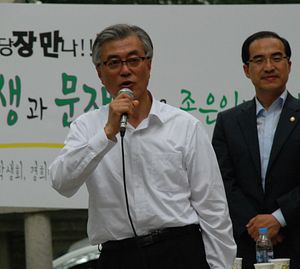Five months after South Korean President Park Geun-hye was impeached following a corruption scandal and massive public protests, the people of South Korea have chosen her successor. Moon Jae-in, the Democratic Party candidate, had a comfortable enough lead in the counting to declare victory just after midnight, local time.
Moon, a 64-year-old former human rights lawyer, will be South Korea’s 12th president. In 2012, Moon ran for president against Park Geun-hye, whose father Park Chung-hee became South Korea’s third president after seizing power in a 1961 coup. In the 2012 election, Moon lost after capturing 48 percent of the vote compared to Park’s 51.6 percent.
Park’s single five-year term was set to end this coming December, but her December 2016 impeachment — upheld by the Korean Constitutional Court on March 10 — cut her term short. The Constitutional Court’s decision set off the 60-day clock for a presidential election. A record 15 candidates registered to run, with two withdrawing before election day.
According to Yonhap News Agency, as of shortly after midnight local time, Moon had captured 39.5 percent of the 12.7 million votes that had been counted. Exit polls predict he’ll end up with over 41 percent. More than 32 million South Koreans voted in the election — 77.2 percent of eligible voters.
“I will build a new nation. I will make a great Korea, A proud Korea. And I will be the proud president of such a proud nation,” Moon told supporters in Seoul.
Hong Joon-pyo of the Liberty Korea Party (the renamed Saenuri Party, minus the formerly Saenuri Party members who defected following Park’s impeachment to for the Bareun Party) looks to be in second with 26.5 percent of the votes counted.
Moon’s victory will put the Democratic Party at the helm in Seoul, a departure from the oppositional role it has filled for close to a decade. His party already enjoys a majority in South Korea’s National Assembly, thanks to a strong showing in the 2016 legislative elections.
Moon’s election comes at a time of renewed international focus on the peninsula — thanks to North Korean missiles tests, botched American carrier bluffs, and tweets. Moon’s previous statements regarding a willingness to negotiate with North Korea could see a new tone emerge in South Korean international engagement. The Moon administration is also set up for possible tensions with the United States, which recently deployed the Terminal High Altitude Area Defense (THAAD) system on the peninsula, much to the irritation of China. Moon has been a critic of THAAD deployment and make seek to revisit the decision once in office.
Moon told supporters his victory “will mark the victory of the people’s desperate wish for a government change. We did our utmost to help realize this aspiration of the people, and I believe that was the driving force that enabled our victory today.”
































